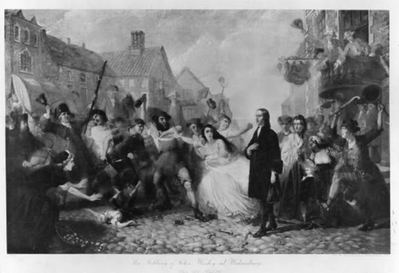 Charles Wesley’s hymn Ye Servants of God, Your Master Proclaim, retained in the new Methodist hymnbook, Singing the Faith, was published in 1744, a time of great turmoil in Britain. With Britain at war with France, Roman Catholics were being persecuted in Britain, and along with them, the newly formed Methodist Societies were treated with great suspicion too—suspected of being Roman Catholics in disguise and accused of attempting to overthrow the Crown. Both John and Charles Wesley made clear their unstinting support for the Monarchy, but they could not hide from the fact that what they wanted was a revolution of sorts: a revival to shake up the religious establishment. Hostility was widespread and in 1743 John had recorded in his diary the event where, after having preached in Wednesbury, he retired to the cottage of a local Methodist where: Before five the mob surrounded the house again in greater numbers than ever. The cry of one and all was “Bring out the minister; we will have the minister.” Through the words of his hymn, Charles Wesley offered hope and support to newly formed Methodist Societies. It is a hymn of great encouragement to all believers with the use of servants in the opening line referring to all Christians. It was published anonymously in a volume entitled Hymns for Times of Trouble and Persecution. The version sung today omits two stanzas to do with faithfulness in the midst of persecution, which I imagine would have been especially enthusiastically sung by the small bands of early Methodists: The waves of the sea have lift up their voice, Sore troubled that we in Jesus rejoice; The floods they are roaring, but Jesus is here; While we are adoring, He always is near. When devils engage, the billows arise, And horribly rage, and threaten the skies: Their fury shall never our steadfastness shock, The weakest believer is built on a rock. Whether it be in the markedly different challenges faced by Christians in Syria recently forced to leave their homes by rebels or Christians in Britain finding ways to respond to increasing scepticism and marginalisation, such words are a great encouragement and comfort. They remind us that, however unlikely it sometimes feels, we have a God who is with us and not a God who is far off. Matthew Comments are closed.
|
Pastoral LettersWritten by the Minister & Members
|
 RSS Feed
RSS Feed